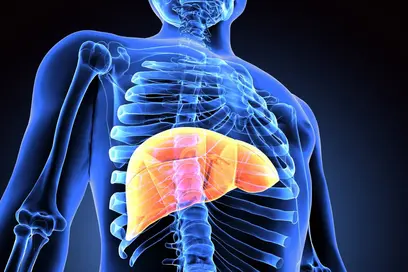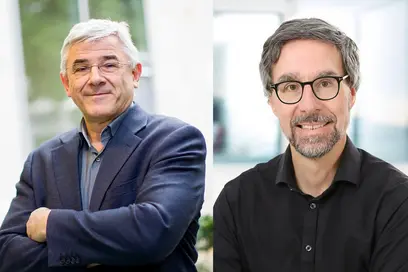Multiple myeloma is a cancer of immune cells producing antibodies. It is called bone marrow cancer, because the cancerous cells typically accumulate in the bone marrow. This rare type of cancer is characterized by a complex spectrum of alterations in the genome. In one subgroup of multiple myeloma, small segments of the genetic material are duplicated. Another subgroup is characterized by rearranged whole chromosomal segments, referred to as translocations.
A team of Heidelberg and London researchers led by Professor Kari Hemminki of DKFZ and Professor Hartmut Goldschmidt from the Department of Internal Medicine of Heidelberg University has investigated whether the cause of these chromosomal changes may be found in the genome of the cells. The investigators took advantage from two large studies, where they already had investigated characteristic changes in the genome of over 1,600 multiple myeloma patients in 2011. They combined the results of these studies with comprehensive data on chromosomal abnormalities in the tumor cells. They analyzed whether specific inherited genetic variants are seen more often in individual subgroups of multiple myeloma patients.
These variants, scientifically called single nucleotide polymorphisms (SNPs), are variations of single base pairs which have asserted to some degree in the genetic heritage of a population and which do not cause disease alone.
For a single SNP from 400,000 SNPs studied, the scientists found a highly-specific correlation with one of the chromosomal translocations characteristic for multiple myeloma: In these tumor cells, specific segments of chromosome 11 are translocated to chromosome 14 (translocation t(11;14)). This anomaly found in about 15 percent of multiple myelomas is characterized by overproduction of cyclin D1, a key regulator of cell division.
There are two different forms of cyclin D1 whose biological and biochemical properties differ substantially from each other. The variant found in the cells is dependent on the SNP associated with the translocation t(11;14) in multiple myeloma. The DKFZ scientists have calculated that carriers of the more frequent of the two “spelling variants", are twice as likely to develop multiple myeloma with t(11;14) translocation.
In addition, the German-British team studied a control group of 155 cases of a benign precancerous stage of multiple myeloma called monoclonal gammopathy. Here they also found the spelling variant of the cyclin D1 gene associated with the (11;14) rearrangement.
Dr. Niels Weinhold of the Department of Internal Medicine of Heidelberg University, first author of the study, explains: “The strong correlation between a specific spelling of cyclin D1 and the translocation suggests a causal link between the two events. It might be possible that the cyclin spelling variant promotes early development of multiple myeloma with translocation t(11;14). However, the exact mechanism behind a causal link between the two events are still unknown."
Kari Hemminki adds: “So far, scientists have assumed that chromosomal abnormalities in cancer occur by chance. Now we have found a first strong indication that a particular gene variant is associated with a specific rearrangement of chromosomal segments. A correlation like this has never been observed before in any other disease."
Approximately 3,500 people are newly diagnosed with multiple myeloma in Germany every year. As a result of uncontrolled growth of myeloma cells in the bone marrow, maturation of normal blood-forming cells is disturbed, possibly leading to anemia and problems fighting infections. Moreover, myeloma cells produce factors affecting the bones and calcium levels, increasing thereby the risk for bone fractures. Antibody fragments made by myeloma cells often accumulate in the kidneys and lead to disrupted kidney functions.
Niels Weinhold, David C Johnson, Daniel Chubb, Bowang Chen, Asta Försti, Fay J Hosking, Peter Broderick, Yussanne P Ma, Sara E Dobbins, Dirk Hose, Brian A Walker, Faith E Davies, Martin F Kaiser, Ni L Li, Walter A Gregory, Graham H Jackson, Mathias Witzens-Harig, Kai Neben, Per Hoffmann, Markus M Nöthen, Thomas W Mühleisen, Lewin Eisele, Fiona M Ross, Anna Jauch, Hartmut Goldschmidt, Richard S Houlston, Gareth J Morgan and Kari Hemminki: The CCND1 c.870G>A polymorphism is a risk factor for t(11;14)(q13;q32) multiple myeloma. Nature Genetics 2013, DOI:10.1038/ng.2583.



